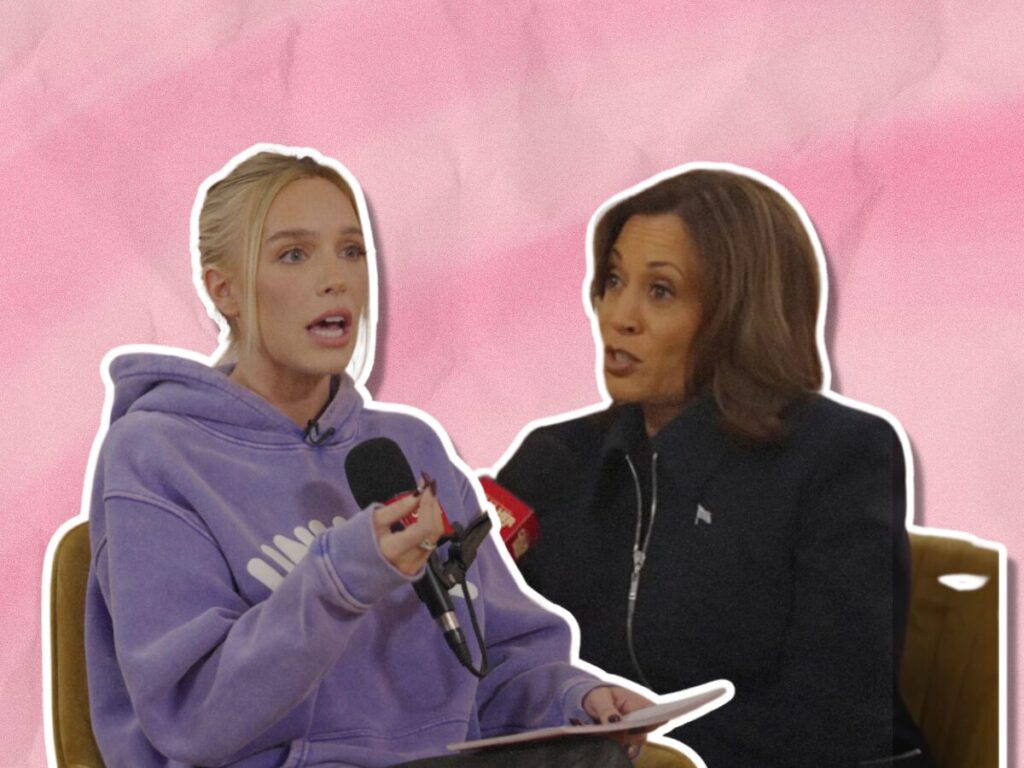Alex Cooper, and her podcast Call Her Daddy, does not usually get political. The typical topics of conversation are sex, relationships, career issues and the personal challenges of her guests’ lives. You can imagine that I (and most of the internet) was pretty shocked to see presidential candidate, Kamala Harris, as the latest interviewee. The more I reflected on it, the more sense it made. Podcasters like Alex Cooper are often dismissed as being too feminine, too concerned with ‘trivial’ relationship issues to be taken seriously. But Cooper has undoubtedly built a business empire; this year she signed a three-year deal with SiriusXM worth up to $125 million. It turns out ‘women’s issues’ are stories and discussions worth hearing and they sell. I think her five million listeners a week will agree.
So, in reality, Kamala’s appearance is a perfect fit. She, more than any other prominent American politician of the moment, advocates for women’s rights and giving women full control over every aspect of their lives. Here are the key takeaways from the interview that none of us were expecting:
“Don’t let things just happen to you”
Kamala starts the interview talking about the personal; being raised by her mother, and what she’s learnt from growing up surrounded by women. She stressed the importance of, irrespective of the power you think you have, taking control of your own life. As the first female Vice President, Kamala has been told countless times that her goals were unrealistic. She told Alex that she learnt not to listen to the “no’s” or the rejection. Define for yourself your boundaries and goals, and remember you are in the driver’s seat of your own life.
“You have agency”
In the upcoming election, she spoke of how voting and engaging in the democratic process is a critical way of exercising your autonomy and agency within the political system. Politics is looking pretty depressing at the moment, especially if you are a woman in America. But remember, Kamala is saying, that your voice still matters. If you care about something enough, go for it, and “don’t do anything half-arsed”.
How do we make America safer for women?
Equality is an economic, not just a social issue. When asked how we start the mammoth task of making America safer for women, Kamala underlined the importance of economic growth. For decades, feminist researchers have highlighted how in economic depressions women are usually the first to leave the workforce and currently in America women make up ⅔ of low paid jobs. Without stable incomes, women (especially mothers) are more likely to stay in abusive relationships and households with domestic abuse.
Sexual abuse is not a private issue, but an issue for us all
Kamala has previously worked as a prosecutor specialising in sexual violence. She revealed a personal experience of her childhood best friend being abused by her stepfather and how Kamala and her mother took her into their own home to provide her with a safe space. On the issue of the prevalence of sexual violence and the stigma for survivors, she said that sexual abuse is a community issue we all need to address. She drew a comparison to the treatment of domestic abuse 50 years ago. Domestic abuse used to be seen as a private issue to be dealt with within the home. We agree now that treating it as a ‘private’ issue only builds a stigma for survivors reporting violence and shrouding the issue in collective silence and ignorance perpetuates and hides abuse. The same is true now for the issue of sexual assault, especially child sexual assault. We need to keep talking about it, keep educating on it and keep providing support systems for survivors, Kamala says.
It’s not just about abortion…
Kamala was the first Vice President (or President) to visit a reproductive health clinic. Ever. And yet state legislatures in the South, full of men, are making decisions about what women can and cannot do with their bodies. But the issue goes further than abortion; shutting down reproductive clinics due to abortion bans (in every state in the South except Virginia) also removes essential services for women’s health. IVF, pap tests, breast cancer screening and contraception are all at risk. And, as Kamala rightly points out, the hypocrisy of the far right is that they stand for less government control in people’s lives. Yet, in the most intrusive and totalitarian manner possible, they are passing medieval Handmaid’s- Tale- style laws which control the most intimate aspects of women’s lives.
